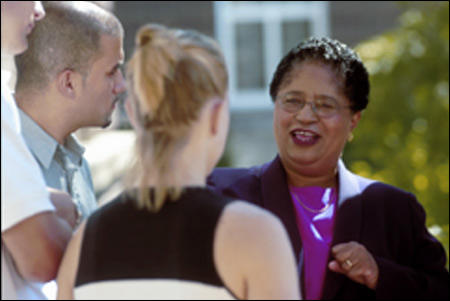More support for science, research needed in U.S.
‘Now is when we should be investing more in research, not less.’

Shirley Ann Jackson is alarmed by what she calls a confluence of negative factors – or a “perfect storm” – that is progressively making the United States lose ground in scientific development.
Speaking at Harvard on May 3, Jackson, a physicist and the president of the American Association for the Advancement of Science (AAAS), pointed out that one of the main challenges for the United States is sustaining its national capacity to advance in science. Top policy-makers, she said, must realize that this is a fundamental component in the road map toward innovation, economic development, and national security.
A recent AAAS report states that the Bush administration, to live up to its pledge to halve the nation’s budget deficit in the next five years, would cut research financing at 21 of 24 federal agencies – all those that do or finance science, except those involved in space and national and domestic security.
Jackson told a crowded Kennedy School seminar room that the lowering of U.S. performance in science puts its future world leadership role at stake.
“The United States has underinvested in research and science,” said Jackson. “Only through the development of science will this country continue assuming a leadership role in the next frontier of the 21st century. Now is when we should be investing more in research, not less.”
Introduced by David Gergen, director of Harvard’s Center for Public Leadership, Jackson – who, as well as presiding over the world’s largest general scientific society, serves as president of Rensselaer Polytechnic Institute in Troy, N.Y. – presented her ideas about what should be some of the strategies to sustain the United States’ national capacity for innovation.
From Jackson’s point of view, it is essential to improve education in math and science in primary schools by enhancing creative pedagogical methods. Considering the change in demographics, it is also important, she insisted, to encourage women and minorities to study science and invest in developing their talent. Today only 20 percent of math and science students in graduate school are women.
“It is fundamental to encourage talented students to get involved in postgraduate work, especially now . . . [with] a drop in foreign students, a declining interest of young Americans in science careers, and many doctors in science retiring,” Jackson said.
Jackson also pinpointed the importance of increasing support to fundamental research and of offering scholarships and financial aid to people dedicated to advanced scientific studies.
“The United States must not fear so much globalization, but prepare our population to be competitive. Asian and European countries are catching up,” she noted.
Jackson has had a remarkable and inspiring career. Two significant historical events, she said, had an impact on her destiny: the Soviet Union’s launch of the first orbiting satellite and the 1954 Supreme Court Brown v. Board of Education decision. With the launch of Sputnik, the United States woke up to the space race and focused on nurturing youthful science talent. Jackson, who had begun her schooling in a segregated grammar school, attended an integrated high school where she was able to take advantage of an enriched science curriculum.
In 1964, Jackson became one of fewer than a dozen African Americans in a Massachusetts Institute of Technology (M.I.T.) undergraduate student body of 4,000. She remembers being cut out of study groups until people discovered her talents. In 1973, she became the first black woman to earn a doctorate at M.I.T, in theoretical elementary particle physics. Her research specialization is theoretical condensed matter physics, especially layered systems, and the physics of opto-electronic materials. In 1995, President Clinton appointed Jackson to be chairman of the U.S. Nuclear Regulatory Commission (NRC). Over a five-year term, she re-established the NRC’s credibility as the watchdog for nuclear safety.
When asked about some of the keys toward her own success, Jackson points to the influence of her father, George Jackson, a postal employee, who used to tell her, “Aim for the stars.” Today she is the one encouraging young people – particularly international students – to pursue careers in science despite obstacles.
“After Sept. 11, the number of international students applying for advanced studies in physical science and engineering in the United States has been declining by more than 25 percent, and fewer are staying,” she noted. “From 2.6 million students that graduated last year from doctoral programs, 1.1 million were Asian, 800,000 from Europe, and 600,000 from the United States,” she said.
To Jackson, immigrants have historically brought to the United States unique energy, and the current trend toward exclusion is not positive. “The so-called melting pot has been a crucible toward having innovative technologies and transformational ideas in this country. Valuing diversity is a requirement to remaining competitive.” It’s necessary, she emphasized, to foster diverse talent, especially among Latinos, who are poised to become the new majority in the United States.
Jackson pointed out that the United States is already behind in the number of articles published in scientific journals, and in the number of Nobel Prize winners.
Today, federal research budgets reach about $126 billion, but that’s not as good as it seems, partly because of the nation’s costly financing for military research, which hit $66 billion.
The scientific community, Jackson said, should get more involved in formulating policies. She noted that President John F. Kennedy’s commitment to the space program promoted a lot of scientific development, and many, including herself, became deeply involved in science as a consequence. “The continuation of that leadership is at stake,” she said.




